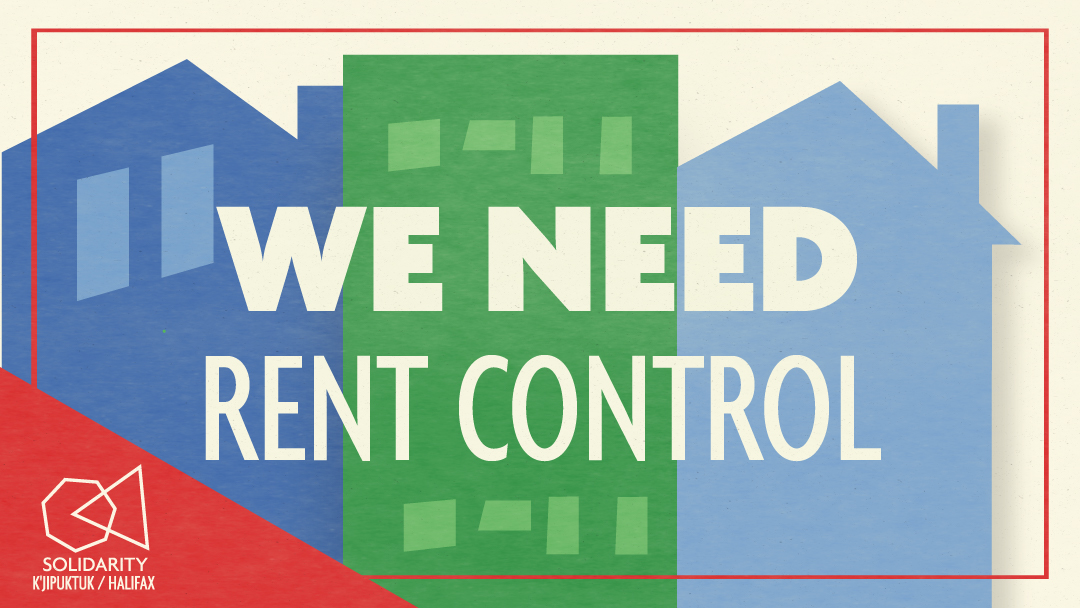
Rent Increases and Rent Control
Landlords have jacked up the rent during the COVID-19 pandemic. According to the latest Rental Market Report by the Canada Mortgage Housing Corporation, landlords in the Halifax Regional Municipality increased rents by an average of 4.1% last year – even despite a slight increase in the overall vacancy rate. Some landlords have increased rents anywhere from 17% to as much as 90%. At least one tenant in Fairview who was told her rent would increase by $650 in April 2021 on top of the $725 she currently pays. Landlords are taking advantage of the crisis to profit at the expense of tenants.
This happens as people in Nova Scotia have the lowest after-tax income in all of Canada. Income Assistance in Nova Scotia is far below Canada’s official poverty line, and continues to decrease when compared to inflation. The minimum wage in the province has not kept up with the Statistics Canada Low Income Cut Off since it was $10 an hour in 2011. Across the country, average hourly wages have barely budged in 40 years. The cost of housing is rapidly increasing while incomes are consistently decreasing.
Meanwhile, the prominent real estate company CAPREIT has reported continued growth this year partly due to increases in average monthly rents. Kevin Russell, executive director of The Investment Property Owners Association of Nova Scotia, says that many rent increases are “in response to landlords wanting safe housing.” The Nova Scotia Landlords Association puts it most clearly by stating that they help landlords increase their income and wealth through their property management and investment. The private housing market enriches the few at the expense of the many. People who live in rental housing need ways to mitigate this crisis. As a starting point, rent control limits the amount that landlords can charge for rent. It is one way to improve the affordability of housing and it can take many different forms. It ranges from setting the absolute amount of rent that can be charged to placing different limits on the amount that rent can increase during or between tenancies. It existed in Nova Scotia until 1993 when it was removed by the Liberals without public consultation.
Recent rent increases in Nova Scotia have forced the provincial government’s hand on capping rent increases. In October 2020, then Premier Stephen McNeil was quoted saying his government is not considering capping rent increases. Less than one month later, then Housing Minister Chuck Porter ordered a 2% cap on rent increases under the Emergency Management Act. The order is scheduled to be in place until February 2022 or until the provincial state of emergency is lifted – whichever comes first.
The order originally included a 2% rent cap on any rental property between tenancies, which means that the cap would have applied to all rental properties even as new tenants come and go. However, that section was quietly removed two days later without any reporting, public debate, or democratic process. For now, there is a temporary 2% cap on how much a landlord can increase rent during a tenancy and any new lease can still be set at ‘market rate’.
Rent control in other jurisdictions
In both Ontario and in Prince Edward Island, there is a permanent cap on annual rent increases – for many, though not all units – at either 2.5% or the rate of inflation. In British Columbia, annual rent increases cannot exceed 1.4%. In Manitoba, there is a rent increase guideline of 1.6% per year, and tenants have a legal mechanism to dispute increases. Québec also has a legal mechanism for landlords and tenants to negotiate the cost of rent. These controls on rent are not without problems and loopholes, but they show that rent control is possible. The recent rent increases in Halifax show that rent control is necessary.
Fighting for housing justice
People living in rental housing have a lot to gain in this struggle. At a minimum, regulating the cost of rent will make landlords follow rules similar to any other business. More broadly, rent control can be a means to building movements that go beyond business as usual. It can limit the power of landlords and build the power of tenants. It can challenge the private housing market and the power it holds over governments and communities. With a fighting movement behind it, rent control can be the first step in a process where housing is provided by the people for the people.